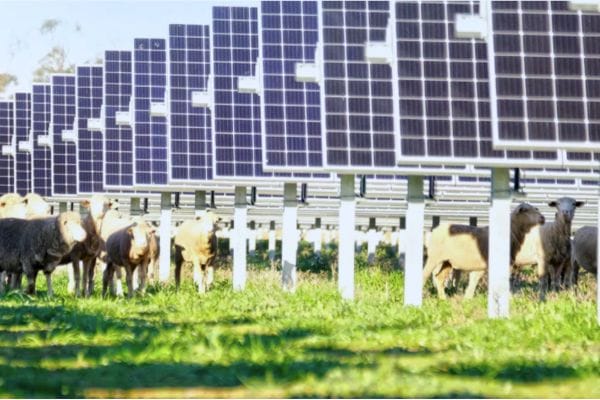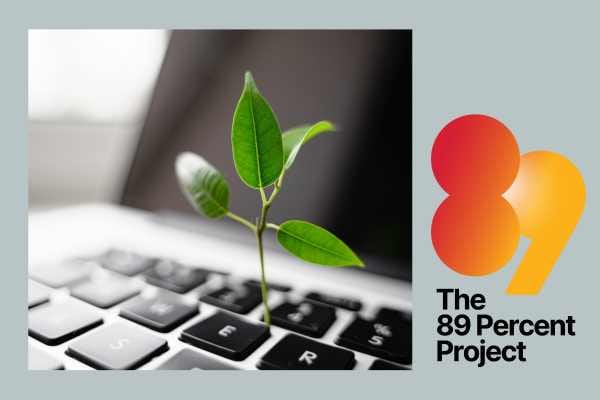Renewables ride on the sheep’s back
A new video series celebrates the arrival of clean energy into Australia’s rural heartland.

Landowners joining Australia’s renewable energy transition are the focus of a new film series, Good Neighbours.
The series highlights stories from rural communities confronting both the challenges and benefits of sharing land with renewable energy projects.
Produced by sustainability champions, The New Joneses, recent episodes focus on farming communities hosting renewable energy infrastructure. Their stories emphasise the potential for dual land use, combining traditional crop and livestock farming with renewable energy projects.
Many farmers have coexisted with infrastructure like transmission lines for decades and are now exploring similar synergies with solar and wind farms, with lease payments providing supplementary income as well as creating new local jobs and long-term sustainability.
In one episode, Angus beef farmer Ed Suttle discusses his role in the development of one of Australia’s largest community-owned solar farms. In a region where local representatives opposed renewables, Ed and his neighbours rallied to fund the solar farm, which now delivers clean energy to the Goulburn area.
“The community support for the Goulburn Solar Farm shows that we are a forward-thinking ‘we can do it’ type of community. We love the fact that nearly all the profit will stay within the community because it's local. It’s local people who own the shares, so the profit will stay here,” he said.
"What these five films show is that communities hosting renewable energy urgently need local support to engage directly with Australia’s energy shift"
In another episode, Simon and Susan Tickner - who describe themselves as food, fibre and wind farmers - have been farming under transmission lines for many years and now host wind turbines as a means of boosting both the profitability and sustainability of their land.
“You’re earning extra income off that land. That makes the farm worth more,” Simon Tickner says.
RE-Alliance, an organisation working to secure an energy transformation for regional and rural Australia, collaborated with The New Joneses to showcase the series as part of a submission to the Australian Senate’s Select Committee Inquiry on Energy Planning and Regulations.
“What these five films show is that communities hosting renewable energy urgently need local support to engage directly with Australia’s energy shift,” RE-Alliance National Director Andrew Bray said.
Some farmers have also reported benefits for the livestock themselves. A recent case study featured by the Australia’s clean energy regulator is the Neoen Numurkah Solar Farm, located 20km from Shepparton in Victoria. The agrisolar project combines sheep farming with solar energy production across 515 hectares, generating 255,000 megawatt hours of electricity annually, that powers 51,000 homes.
In the case study, the farm has also reported unexpected benefits such as irrigating grass beneath the panels from the moisture that accumulates overnight, allowing sheep to graze underneath even during drought. It also reduced the need for mowing and pesticides, and provided them with shade and protection.
Community first
In spite of these benefits, concerns persist in some regional areas about landscape impact, noise, and potential effects of renewable energy infrastructure on agriculture.
And critics argue that developers too often overlook agriculture in their initial renewable project plans, opting to buy land outright instead of promoting mixed land use.
RE-Alliance advocates for an energy transformation that delivers long-term benefits for rural Australia by ensuring communities are at the centre of project planning from the start.
A key solution it proposes is creation of Local Energy Hubs tasked with guiding communities through the renewable energy transition to ensure better outcomes for locals.
To this end, a proposal to establish 50 Local Energy Hubs across regional Australia is a key part of the joint submission by RE-Alliance, Community Power Agency, and Yes2Renewables to the Senate's Select Committee - accompanied by the regional stories in The Good Neighbours series to illustrate the benefits.
If funded by the Federal Government, they say these hubs would serve as outreach centres, staffed by trusted locals to help residents and farmers navigate the renewable energy transition.
The Good Neighbours film series, produced by sustainability champions, The New Joneses, is hosted by Neighbours star Ryan Moloney. The series takes viewers on a road trip through Australia’s renewable energy transition. Travelling to the Latrobe Valley and Horsham in Victoria, and Wollongong, Goulburn, and Crookwell in New South Wales, Moloney explores how regional communities are driving the country’s shift to renewables. You can watch The Good Neighbours series here.





